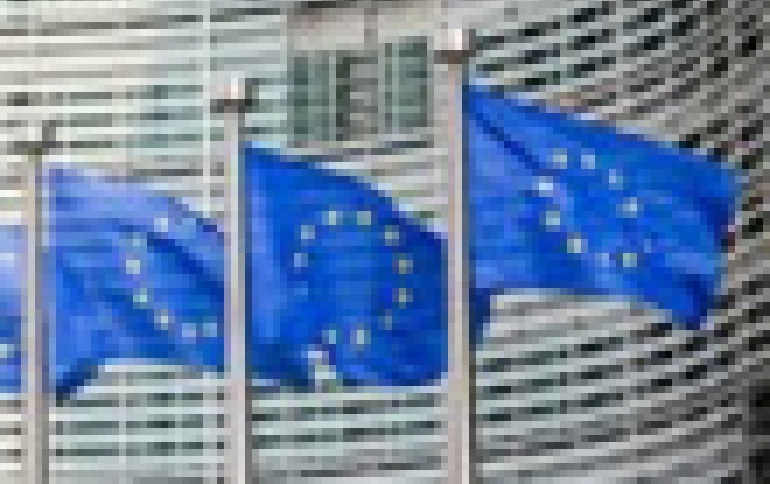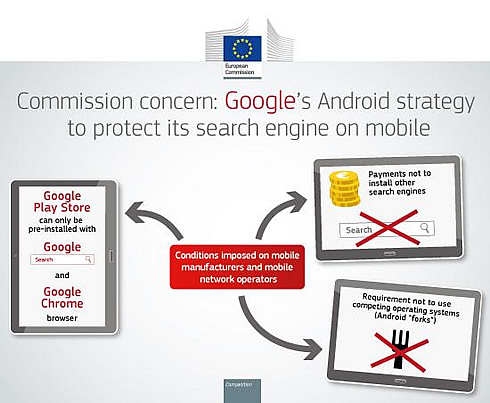
Europe Sends Statement of Objections to Google on Android And Applications
The European Commission has informed Google of its preliminary view that the company has, in breach of EU antitrust rules, abused its dominant position by imposing restrictions on Android device manufacturers and mobile network operators. The Commission's preliminary view is that Google has implemented a strategy on mobile devices to preserve and strengthen its dominance in general internet search. First, the practices mean that Google Search is pre-installed and set as the default, or exclusive, search service on most Android devices sold in Europe. Second, the practices appear to close off ways for rival search engines to access the market, via competing mobile browsers and operating systems. In addition, they also seem to harm consumers by stifling competition and restricting innovation in the wider mobile space.
The Commission's concerns are outlined in a Statement of Objections addressed to Google and its parent company, Alphabet. Sending a Statement of Objections does not prejudge the outcome of the investigation.
Commissioner Margrethe Vestager, in charge of competition policy, said: "A competitive mobile internet sector is increasingly important for consumers and businesses in Europe. Based on our investigation thus far, we believe that Google's behaviour denies consumers a wider choice of mobile apps and services and stands in the way of innovation by other players, in breach of EU antitrust rules. These rules apply to all companies active in Europe. Google now has the opportunity to reply to the Commission's concerns."
Smartphones and tablets account for more than half of global internet traffic, and are expected to account for even more in the future. About 80% of smart mobile devices in Europe and in the world run on Android, the mobile operating system developed by Google. Google licenses its Android mobile operating system to third party manufacturers of mobile devices.
The Commission opened proceedings in April 2015 concerning Google's conduct as regards the Android operating system and applications. At this stage, the Commission considers that Google is dominant in the markets for general internet search services, licensable smart mobile operating systems and app stores for the Android mobile operating system. Google generally holds market shares of more than 90% in each of these markets in the European Economic Area (EEA).
In today's Statement of Objections, the Commission alleges that Google has breached EU antitrust rules by:
- Requiring manufacturers to pre-install Google Search and Google's Chrome browser and requiring them to set Google Search as default search service on their devices, as a condition to license certain Google proprietary apps;
- Preventing manufacturers from selling smart mobile devices running on competing operating systems based on the Android open source code;
- Giving financial incentives to manufacturers and mobile network operators on condition that they exclusively pre-install Google Search on their devices.

The Commission believes that these business practices may lead to a further consolidation of the dominant position of Google Search in general internet search services. It is also concerned that these practices affect the ability of competing mobile browsers to compete with Google Chrome, and that they hinder the development of operating systems based on the Android open source code and the opportunities they would offer for the development of new apps and services.
Google disagrees and has hit back at the charges. Kent Walker, Senior Vice President and General Counsel at Google says:
"The European Commission has been investigating our approach, and today issued a Statement of Objections, raising questions about its impact on competition. We take these concerns seriously, but we also believe that our business model keeps manufacturers’ costs low and their flexibility high, while giving consumers unprecedented control of their mobile devices.
He goes to say that people are free to make changes to Android, and that the ecosystem that has been put in place helps to ensure compatibility for users. He concedes, however, that Android is not cheap to develop, adding "we provide Android for free, and offset our costs through the revenue we generate on our Google apps and services we distribute via Android".
Google now has 12 weeks to respond to the charges.
This investigation is distinct and separate from the Commission's ongoing formal investigation under EU antitrust rules of other aspects of Google's behaviour in the EEA, including on the favourable treatment by Google in its general search results of its own other specialised search services, and concerns with regard to copying of rivals’ web content (known as 'scraping'), advertising exclusivity and undue restrictions on advertisers.




















